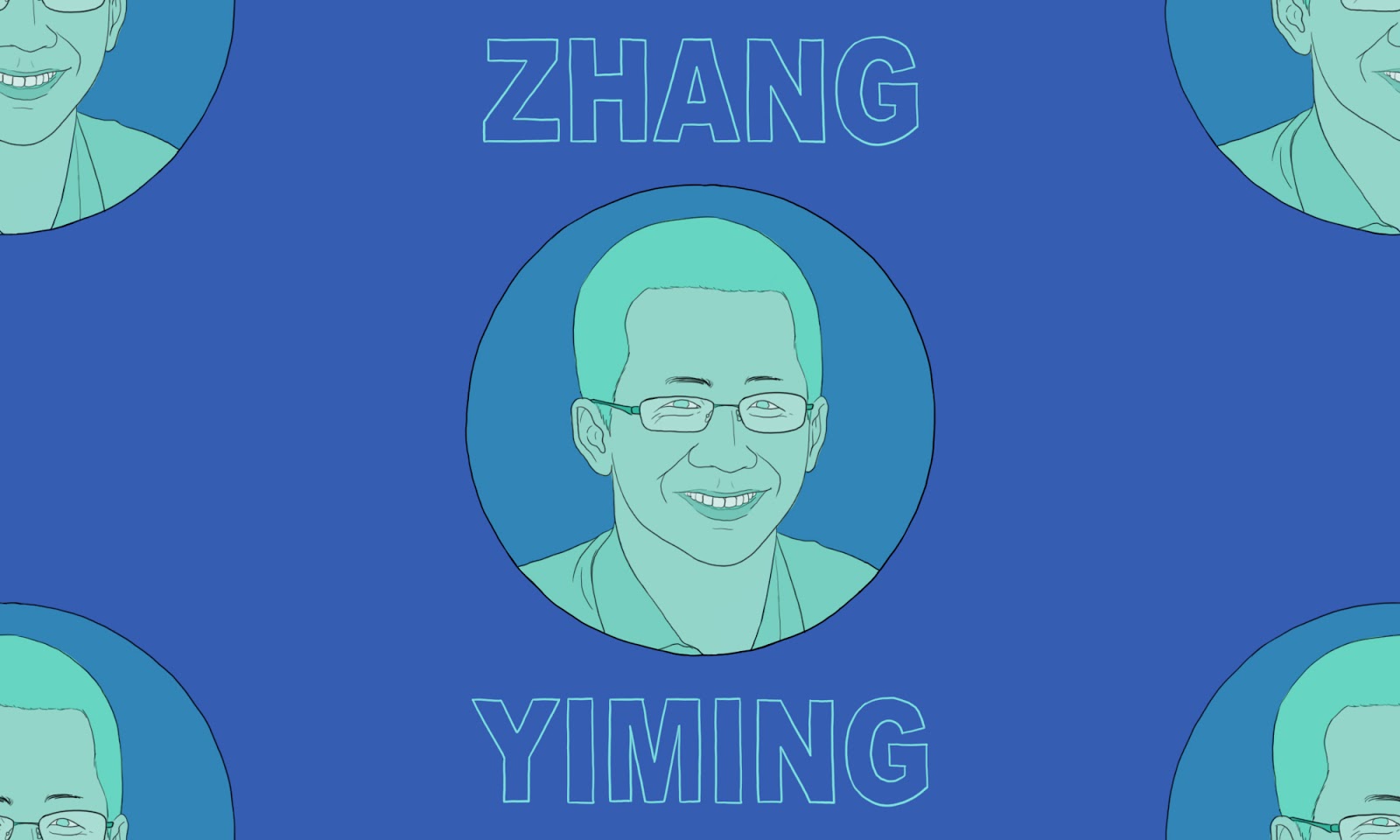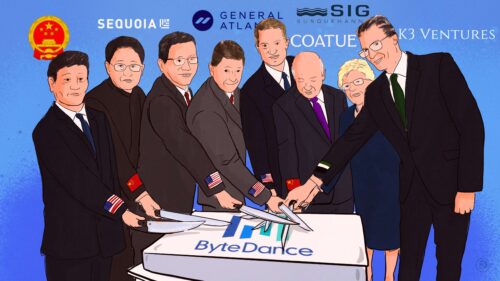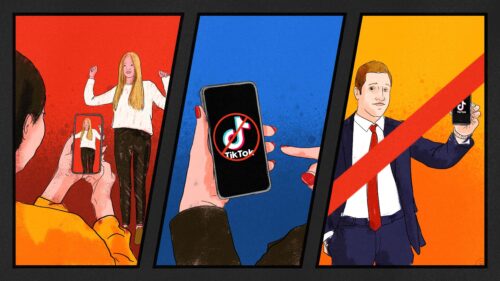ByteDance is one Chinese tech’s great success stories. Less than a decade old, its estimated worth of $100 billion makes it the most valuable startup in the world, dwarfing old faces like Coca-Cola, Disney, and McDonald’s. It’s one of the few Chinese companies to break out of the Middle Kingdom, with TikTok firmly established among U.S. millennials, its 800 million users making Twitter’s 330 million seem paltry and nipping at the heels of Instagram’s 1 billion.
But power hasn’t prevented TikTok from becoming a pawn in tempestuous U.S.-China relations. Fears of the Chinese Communist Party forcing ByteDance to supply it with the private data of American users (Apple has refused such requests for the U.S. government, even to aid FBI investigations) are being exploited by the Trump administration, which is threatening to ban the app unless ByteDance sells it to a U.S. entity. (You can follow all the latest here, including complications to a proposed sale to Oracle and Walmart.)
The man leading ByteDance through these challenging days is its founder and CEO, Zhāng Yīmíng 张一鸣. His is a life motivated entirely by business and “big dreams.” Like Western criticisms of Mark Zuckerberg, Zhang has been harried by concerns of national and social responsibility. Although “Chinese company” is a label fretted over in the States, ByteDance has more in common with U.S. conglomerates than many believe.
Who is Zhang Yiming?
It’s easy to forget he’s China’s ninth richest man. The billionaire 37-year-old is often clad in jeans, hoodie, or t-shirts, an easygoing, gentle figure rarely angered and quick to smile. He can come across as a bit boring — “I confess that I don’t have a particularly strong hobby,” he told Caijing Magazine — but he insists on massages once a week.
Communication doesn’t seem to be his strong point. Asked in the same interview about the moment he first realized ByteDance had “potential,” his response indicated he took the question literally: “In physics, potential energy means the momentum an object earns by lowering its position, but we didn’t jump down.”
His substance makes him special, not his style. He’s a man who’s bent his life around systems: he obsessively experimented to find out his optimal productive state (somewhere between “just a little sad” and “just a little excited”), and found he worked harder when he practiced “delayed gratification.”
Computing was always his passion. He dates his first venture into IT to his parents buying a desktop computer for their home in Fujian Province, as the country began opening up in the 1980s. Zhang saw its screen as a window of opportunity and creative “freedom” while growing up.
Zhang headed to Nankai University in 2001, one of the top 10 higher education institutions in the country, focusing on software engineering. After working for a string of startups from 2008 to 2011, he noticed smartphone purchases in China were booming, overtaking U.S. purchases in late 2011. There would soon be a lot of people wanting an improvement on the clunky apps and inefficient search engines of the time.
The biographies he read had made him notice how little people see developing trends, only taking action once it’s too late.
He would be different. In 2012 Zhang founded ByteDance, aiming to design user-friendly entertainment and news apps for smartphone users. The company’s first office was a converted four-bedroom apartment, with work occasionally punctuated by the electricity being shut off.
The crown jewel was Toutiao (meaning “headlines”), which used a special algorithm to tailor article suggestions to what the user was interested in, rather than the news they “should” be reading. “The only headlines are the ones you care about” was Toutiao’s motto until early 2018.
The more time spent on the app, the better the algorithm’s recommendations were, keeping users engaged. The algorithm worked so well that some joked you could learn everything about a blind date from their recommendations. Likened by the Sydney Morning Herald to “a cross between Google and Facebook,” Toutiao had 272 million monthly users as of March 2020, making it the second-largest Chinese news app behind Tencent News.
Zhang’s laissez-faire approach to the algorithm’s recommendations became problematic. Users were angered over “vulgar” stories and dodgy medical ads. Zhang probably was aware of the problem, but did nothing about it, for the same reason Facebook didn’t monitor misinformation in the run-up to the 2016 election. As Zhang said at a conference in October 2017, most of his decisions are “driven by business.” The clicks were all that mattered.
In 2016 Xí Jìnpíng 习近平 announced he expected Chinese search engines and social media to monitor their content for harmful material — fake news, pornography, scams. Zhang ignored this, leading to some ByteDance apps being shut down, Toutiao repeatedly suspended. He had no choice but to write a letter of apology promising to adapt the site to the “core values of socialism” — Toutiao has since started using its platform to help families locate missing persons.
War of the Worlds
Zhang had global ambitions. In a talk from 2014, he argued China was entering a “golden age” for breaking onto the world stage: “There is no longer a gap between the entrepreneurial environment of China and the U.S., there are just differences.” A short stint at Microsoft back in 2008 meant he knew the American market. He hoped Toutiao could become a site to rival Google in a cyberspace devoid of borders. He urges employees to think in terms of a “Martian”: how can the company work for the whole planet?
He ended up borrowing from the playbooks of other global tech companies like Google and Facebook. Whereas companies like Tencent and Alibaba are excessively hierarchical, ByteDance is “flat”: levels of management are few, colleagues collaborate easily on projects, sobriquets indicating status done away with. Zhang thinks ByteDance gets its edge from this structure, allowing for innovation to thrive.
He’s always looked for new horizons. When asked by Caijing what his first memory of Beijing was after arriving there after graduation, he gave a strange response — instead of the city, what stuck in his memory was the rows of white poplars lining the road from the airport. Glimpsed through these trees were panoramic views of the plains surrounding the city and the mountains beyond. Zhang prefers being a “pioneer,” championing big-picture thinking over humdrum routine.
Most CEOs would have been content with Toutiao, but Zhang saw something beyond. In September 2016, ByteDance quietly launched Douyin. It combined the Chinese love of livestreaming with a rapidly dwindling user attention span: users could easily create 15-second lip-synching or music videos. It was so popular that WeChat — owned by rival company Tencent — blocked links to it. The popularity translated to the U.S., with the app rebranded as TikTok in September 2017. Zhang’s dream of global influence was slowly coming true.
It was essential to show TikTok was a safe, all-American business. The company points out that user data is stored outside China and hires lobbyists to push for them on Capitol Hill. ByteDance immediately shut down operations in Hong Kong once the CCP started exerting influence in the city. It set up a separate U.S.-based company, TikTok Global, and tabbed former Disney CEO Kevin Mayer to run it.
But TikTok couldn’t outrun its origins. “We have never received such a request [to fork over data] from the Chinese government, and we don’t think there will be such a request,” Zhang told The Atlantic in July. “Even if we get such a request, it is impossible” to obey. ByteDance has noted that evidence provided in the past to the Committee of Foreign Investment in the United States (CFIUS) was more than enough to address concerns on national security. Statements made by TikTok say executive orders made by Trump aren’t based on any evidence.
Although state media focuses on this as a display of American bullying, reactions from Chinese netizens vary. Many are unhappy with Zhang. They already know him as a man driven by business rather than social responsibility or national pride. That he would sell out one of the few Chinese tech companies with global success hasn’t gone down well, and he’s presented as a spineless American lackey. Ironic, given how Westerners view TikTok as a potential Chinese mole.
A new cartoon by Chinese-Australian artist @badiucao as TikTok pulls out of Hong Kong. Full story: https://t.co/KPNvsSRRK4 @tiktok_us #hongkong #tiktok #china pic.twitter.com/AQHc7dtVTl
— Hong Kong Free Press HKFP (@hkfp) July 8, 2020
Zhang’s dream of global power continues, but the recent resignation of Kevin Mayer as TikTok CEO (citing the dramatic change in the political climate and that he’d signed up for a “global role”) shows which way the wind is currently blowing. Zhang is coming up against an older trend: the cruel law of the Go-Between. When there is little understanding, interaction, or trust between two societies, the person who does business between them will earn the resentment and distrust of at least one, branded a member of the other. Choose a side while you can, or risk a decision being made for you.
There are numerous historical precedents. Jesuits in China had a hard time convincing the rest of the Catholic church that their tolerance of Chinese ancestor-worship was not an abandonment of their religious beliefs. But this didn’t stop them from being lumped together with other Christians, banned from preaching in China by the Yongzheng Emperor in 1724. As with the catastrophic failure of Disney’s new live-action Mulan in both China and the U.S., ByteDance is seen by both sides as too loyal to the other. Zhang is attempting to have a foot in both camps, ignoring the widening chasm below.
Chinese Lives is a weekly series.






